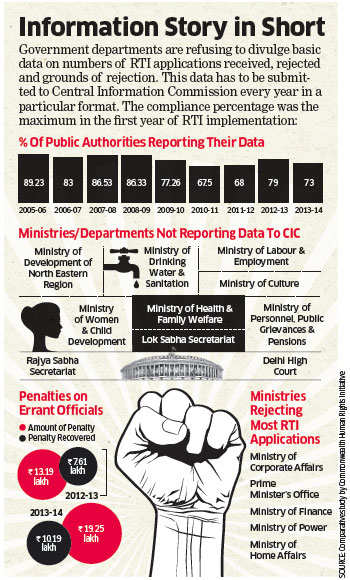The Economic Times: New Delhi: Wednesday, April 1, 2015.
A decade after enactment of the Right to Information Act, a study conducted by Commonwealth Human Rights Initiative has revealed that the government departments are unwilling to share even basic data on how many RTI applications have been received, disposed of or rejected.
The study shows that the percentage of public authorities unwilling to share this data with Central Information Commission ( CIC), the transparency watchdog, has increased over the years, with 27% of government departments not reporting this data in 2013-14, compared to 11% in 2005-06, the year of introduction of RTI Act.
CHRI study says while the Supreme Court has been conscientious about reporting the number of RTI applications, rejections and even grounds for rejections, Delhi High Courthas not reported this data.
 As per the study, 2012-13 saw an increase of 22% in the number of applications received across board, compared to the previous year, but in the next year the increase was just 2.7%, with 8.34 lakh applications received.
As per the study, 2012-13 saw an increase of 22% in the number of applications received across board, compared to the previous year, but in the next year the increase was just 2.7%, with 8.34 lakh applications received.
"The question here is — has an RTI fatigue set in? Or will the number of applications increase considerably if all public authorities were to report their statistics?" asked CHRI's Venkatesh Nayak.
The comparative study also points to a worrying trend of rejection of applications by some ministries.
The corporate affairs ministry, which finished at the top for rejecting applications in 2013-14, saw a 300% increase in the rejection rate over 2012-13. The power ministry also doubled its rejection rate.
Some ministries, however, reduced their rejection rates drastically. According to the study, the external affairs ministry reduced its rejection rate by 40%.
Similarly, the rejection rates in railways, commerce, chemicals and fertilisers, civil aviation, food and environment ministries fell substantially during the year.






























